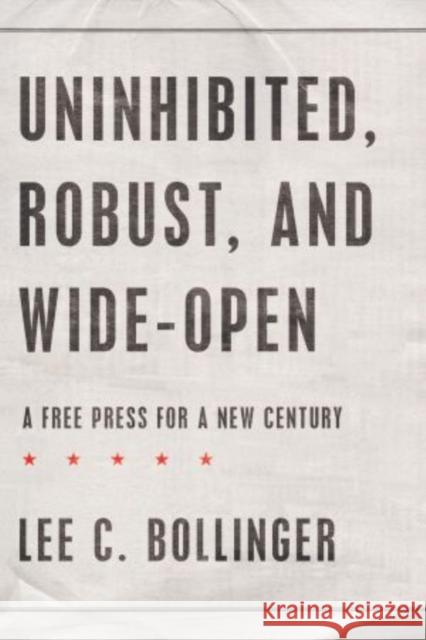Uninhibited, Robust, and Wide-Open: A Free Press for a New Century » książka
Uninhibited, Robust, and Wide-Open: A Free Press for a New Century
ISBN-13: 9780195304398 / Angielski / Twarda / 2010 / 224 str.
Lee Bollinger is one of our foremost experts on the First Amendment--both an erudite scholar and elegant advocate. In this sweeping account, he explores the troubled history of a free press in America and looks toward the challenges ahead.
The first amendment guaranteed freedom of the press in seemingly clear terms. However, over the course of American history, Bollinger notes, the idea of press freedom has evolved, in response to social, political, technological, and legal changes. It was not until the twentieth century that freedom of the press came to be understood as guaranteeing an "uninhibited, robust and wide-open" public discourse. But even during the twentieth century, government continually tried to erect barriers: the sedition laws of World War One, the use of libel law, the Pentagon Papers case, and efforts to limit press access to information.
Bollinger utilizes this history to explore the meaning of freedom of the press in our globalized, internet-dominated era. As he shows, we have now entered uncharted territory. What does press freedom mean when our news outlets can instantaneously disseminate information throughout the world? When foreign media have immediate access to the American market? Bollinger stresses that even though the law will surely evolve in the coming years, we must maintain our commitment to a press that is "uninhibited, robust, and wide-open," not only in America but everywhere. Given the new ability of foreign media to reach the United States via the Internet and vice versa, it is in America's national interest for press freedoms to expand overseas. While protecting the freedom of the press at home remains a crucial task, the next challenge is to help create a global public forum suitable for an increasingly interconnected world. Part of Oxford's landmark Inalienable Rights series, this book will set the agenda for how we think about the press in the twenty-first century.











